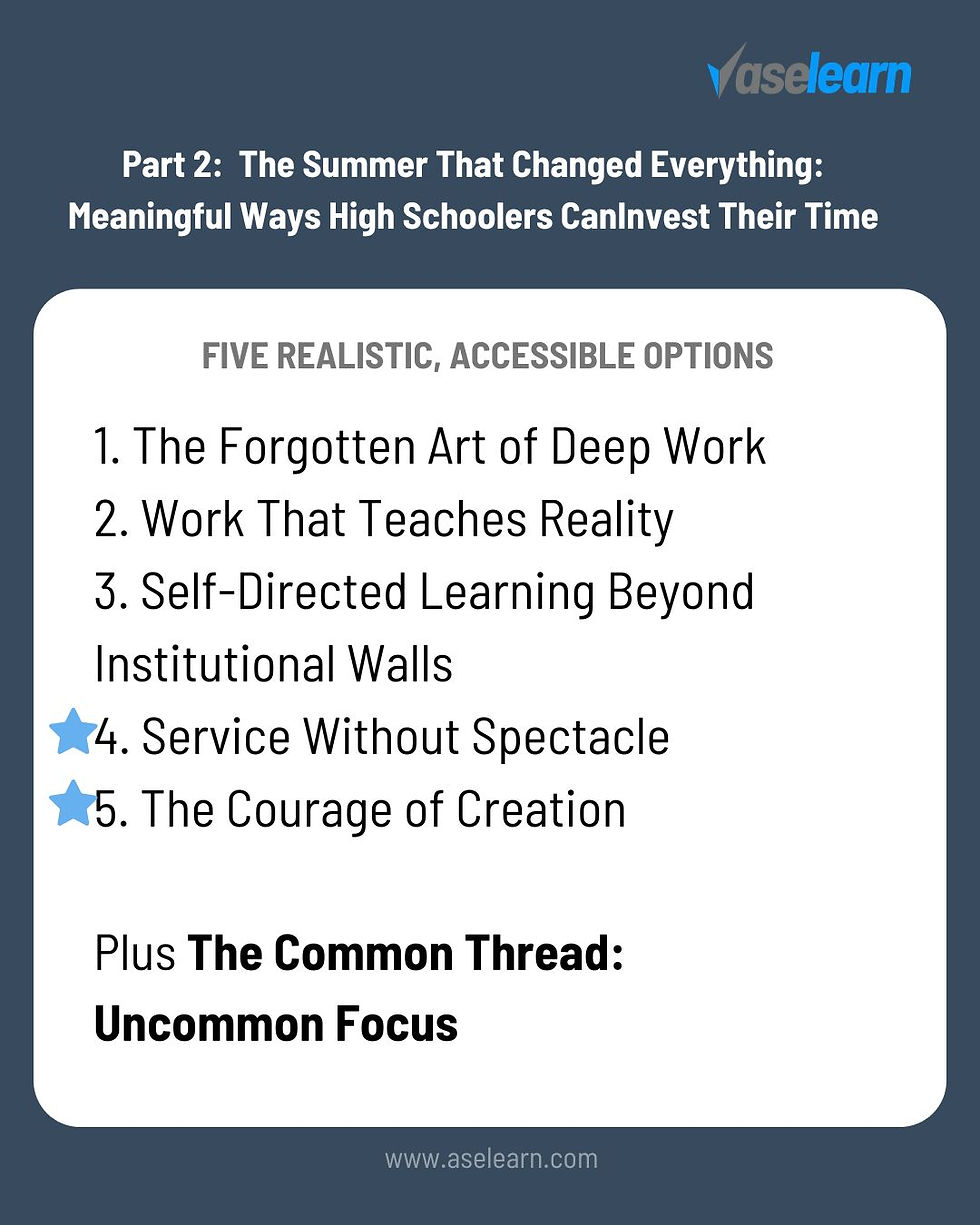The Summer That Changed Everything: Meaningful Ways High Schoolers Can Invest Their Time -- Part 2
- ASE Learn

- Jun 21, 2025
- 4 min read
Written by: ASE Editorial Team
Beyond the Resume Rat Race: Finding Genuine Value in Summer Activities! Be tolerant with others and strict with yourself. But guess what?

Let’s continue from where we left off! What are the fourth and fifth realistic options, plus what did Marcus Aurelius write about "self" and what about the verdict for 'The Common or Uncommon Thread
Beyond the Resume Rat Race: Finding Genuine Value in Summer Activities for High Schoolers
As Marcus Aurelius wrote, “Be tolerant with others and strict with yourself.” This applies perfectly to how high schoolers should approach summer: not by chasing activities that merely look good, but by pursuing experiences that genuinely develop character and skills. Such activities (including customer service jobs, volunteering opportunities, and related fields) require adaptation to routine, self-accountability, and discipline, which encourages students to be strict with themselves when it is necessary. These workspaces also provide diverse experiences and interactions with people from different stages of life. Moreover, they encourage tolerance, emotional intelligence and experiences that translate well into the classroom and life even after schooling.
The student who founded a charity just to have something impressive to list on applications isn’t fooling anyone. College admissions officers can spot manufactured experiences from miles away. When they ask you to write a proposal for a school’s charity or critique an existing charity, will your experience shine through?
Consider these five realistic, accessible options that provide actual growth rather than just resume fodder. Three of the five options were discussed in the first article. Check them out here before continuing.
4. Service Without Spectacle
Social media has trained us to broadcast our good deeds, but true character is built through
unannounced service. The Stoics practiced what they called “secret good deeds”—acts of
kindness performed without public recognition.
For the high schooler, this might mean regularly visiting an elderly neighbor, volunteering
consistently at a local food bank, or mentoring younger students in academics. These
experiences develop empathy and perspective while avoiding the subtle corruption that comes
from performing good deeds for external validation. Parents who have taken part in such
activities can point them out to their children and encourage volunteering as a good way to
spend part of the summer. A study published in the Journal of Adolescent Health found that
teens who volunteer were 50% less likely to engage in destructive behaviors like drug use and
truancy. These activities also promote a sense of responsibility and kindness towards others, a
summer spent working on these could make a big difference for the child’s future.
5. The Courage of Creation
When Lin-Manuel Miranda began working on what would become “Hamilton,” he wasn’t
guaranteed success—he was taking a creative risk. High school summers offer time for creative projects without the pressure of grades or external evaluation.
Whether it’s writing a novella, building a computer from components, creating a documentary
about your hometown, or launching a podcast interviewing local business owners, creative
projects teach persistence, problem-solving, and the courage to put your work into the world.
Developing that creativity also builds confidence, allowing children to bring their own unique
perspectives to certain situations, especially if these creative pursuits also help them build skills necessary for success in their chosen career paths or interests.
Expert Tip: ☀️The summer season isn’t about having a great plan—For high schoolers, it’s a chance to rest and reset. For parents and educators, it’s just about rest, reset, and encouragement and a little believe. One little step at a time!

The Common Thread: Uncommon Focus
What connects all these suggestions is precisely what makes them rare: they require sustained attention in an age of distraction. They demand the courage to step away from what peers are doing. They require what the ancient Stoics called “voluntary discomfort”—choosing the harder path not because it looks impressive but because it leads to growth.
As Seneca wrote, “We suffer more often in imagination than in reality.” The high schooler
avoiding challenging summer activities for fear of failure would do well to remember these
words. The rejection from an internship, the frustration of learning a new skill, the discomfort of working outdoors—these temporary struggles create permanent strength.
Ask yourself: When September arrives and classmates exchange stories about “doing nothing” all summer, what will you have built, learned, or contributed? Which path leads to the person
you hope to become? As a parent, what would you have contributed to your child’s growth as a
student of life and a person? You can start bringing up the discussion, clipping some vacancies in the newspaper or finding something that you can do together. Working on a volunteer project together might actually be rewarding.
Ultimately, what we focus on is what we attract, and making proper use of the summer period sets up children for a successful school session while building skills and values that will carry them through life.
Focus is what connects all these suggestions, and though it may seem stressful, we find later on that it is all worth it.
What are your thoughts?
============================ More for you. ===================
Maybe you're thinking, "How can I support my child or my student to reach potential with a focus on holistic wellbeing for everyone?" Check out our Products & Services for ideas.
Also take a look at KEKO Learn. This is a unique hands-on program that builds-nurtures-reinforces school taught SUBJECTS AND CONCEPTS for elementary school students.
~~~~~~~~~~~
Remember: Blog content and information on the website are for informational purposes and therefore should not be considered as medical advice. Please reach out to your doctor or school counsellor if you have questions about your child.


